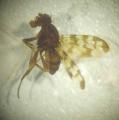Diptera.info :: Literature :: What should I use?
|
Ecology of Rhinophoridae
|
|
| John Bratton |
Posted on 11-05-2007 12:50
|
|
Member Location: Menai Bridge, North Wales, UK Posts: 662 Joined: 17.10.06 |
A web search hasn't produced much information about the ecology of Rhinophoridae so it is perhaps worth drawing attention to the following. R.A. Bedding wrote a Ph.D. thesis in 1965 at Imperial College, London University on Parasitism of British terrestrial isopods by Diptera and it is summarised in Sutton, S.L., 1972. Invertebrate types: woodlice, London, Ginn & Co. The study involved dissecting over 20,000 woodlice. Of 17,000 Porcellio scaber, over 10% were parasitised, mostly by Paykullia maculata but also Phyto discrepans, Melanophora roralis, Rhinophora lepida, Tricogena rubricosa and Ph. melanocephala. A small percentage of 2,600 Oniscus asellus were parasitised by P. maculata and Ph. discrepans. Ph. melanocephala was the only rhinophorid found in the pill woodlouse Armadillidium vulgare. Of 117 Trachelipus rathkei, 9 were parasitised by Stevenia atramentaria. Melanophora was found mostly in the upper seashore, Phyto discrepans was synanthropic (rubbish dumps and gardens) and Paykullia was found in woodlice under loose bark. Now a question for our Dutch correspondents: Why is the Dutch word for a terrestrial isopod a pissebed? Does it mean what it sounds as though it ought to mean? I understand you use the same word for the plant dandelion (Taraxacum), which is understandable as eating dandelion is well known to make you wet the bed. But no one eats woodlice, do they? Is it because woodlice are attracted to damp mattresses? John Bratton |
|
|
|
| Paul Beuk |
Posted on 11-05-2007 14:11
|
|
Super Administrator Location: Netherlands Posts: 19403 Joined: 11.05.04 |
I'd have to check on the correct etymology of the Dutch word pissebed but the common Dutch word for dandelion is paardebloem (horseflower). I never heared it mentioned as pissbed but maybe that name was used in the old times.
Paul - - - - Paul Beuk on https://diptera.info |
| Susan R Walter |
Posted on 18-05-2007 12:44
|
|
Member Location: Touraine du Sud, central France Posts: 1802 Joined: 14.01.06 |
John Ground woodlice are mentioned in at least one medieval medical text as being used for indigestion. They are also known as pill beetles, presumably because of their habit of rolling into a ball, and perhaps one could also swallow them whole, therefore I suspect the connection is a sort of sympathetic magic thing, and it is possible that they did sort of work if the composition of woodlice bodies includes something like bicarbonate of soda. So yes - people did eat woodlice 
Susan |
| John Bratton |
Posted on 26-08-2009 17:33
|
|
Member Location: Menai Bridge, North Wales, UK Posts: 662 Joined: 17.10.06 |
So pissebed is not only the Dutch name. According to Peter Marren's article on the folk names of invertebrates (British Wildlife 20: 381-387, Aug 2009), pissibed is an old British name for woodlouse. He suggests it is because they smell of urine. I've never noticed. John Bratton |
|
|
|
| cebe |
Posted on 04-09-2009 12:46
|
|
Member Location: Posts: 99 Joined: 16.05.06 |
]« I understand you use the same word for the plant dandelion (Taraxacum), which is understandable as eating dandelion is well known to make you wet the bed. » maybe You are referring tho the french and not the dutch word for taraxacum «pissenlit»... bart Edited by cebe on 04-09-2009 12:47 |
| Jump to Forum: |













